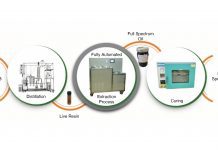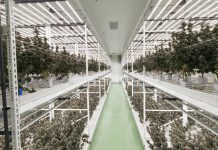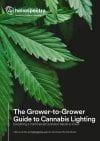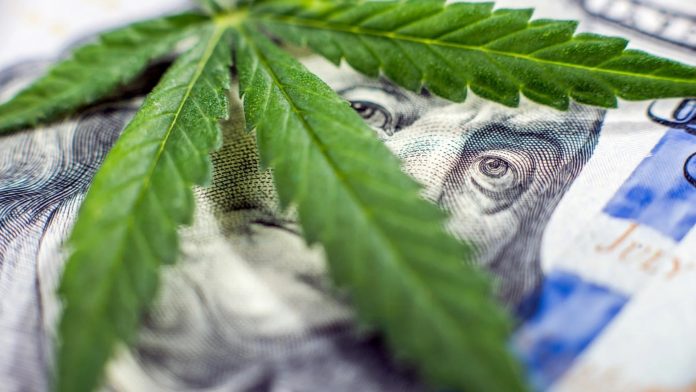
George Stantchev, PhD, the CEO of COMERG, provides a detailed and insightful analysis of the effects of a recession on the cannabis market, and how companies can become future-proof.
The world is changing daily. The world economy is affected by the market, pandemics, customs, ethnicity, religion, politics, etc. Whatever worked years ago will not be applicable now. The customer gets more educated and, in many cases, is influenced by convenience. The cannabis market is not exempt from these changes and has faced difficulties over the last few years.
There are normal cycles in the economy that drive customer behaviour. Below is an overview of the changes in the economy when the cost of raw materials changes and the adjustment of the consumers.
- Inflation is a general increase in the prices of goods and services in an economy. When the general price level rises, each unit of currency buys fewer goods and services.
- Recessions generally occur when there is a drop in spending. In a recession, you would usually expect a fall in the inflation rate due to lower economic activity.
- Stagflation is rising inflation and falling sales. If countries respond to a fall in output governments react by printing money, then this could lead to hyperinflation
In an inflated market, a few sequences affect the market:
- Firms have unsold goods: To improve their cash flow they try discounting goods to get rid of their excess stock.
- Lower wage growth: As unemployment rises and there is more competition for job vacancies. Unemployment should reduce wage inflation.
- Lower commodity prices: A global recession should usually reduce demand for commodities and reduce the price of commodities.
- Lower expectations: Low confidence in an economy usually reduces inflation expectations.
- Falling asset prices: In a recession, the price of assets tends to fall due to lower demand. This leads to lower wealth and therefore, less spending.
Understanding recession psychology
Purchases depend on consumers having disposable income, feeling confident about their future, trusting in business and the economy, and embracing lifestyles and values that encourage consumption.
According to Harvard research, there are four types of goods that become a reference:
- Essentials are necessary for survival or perceived as central to well-being.
- Treats are indulgences whose immediate purchase is considered justifiable.
- Postponables are needed or desired items whose purchase can be reasonably put off.
- Expendables are perceived as unnecessary or unjustifiable.

There are four types of consumer behaviour:
- The slam-on-the-brakes segment feels most vulnerable and hardest hit financially. This group reduces all types of spending by eliminating, postponing, decreasing, or substituting purchases.
- Pained-but-patient consumers tend to be resilient and optimistic about the long term but less confident about the prospects for recovery in the near term or their ability to maintain their standard of living.
- Comfortably well-off consumers feel secure about their ability to ride out current and future bumps in the economy. They consume at near-pre-recession levels, though now they tend to be a little more selective (and less conspicuous) about their purchases.
- The live-for-today segment carries on as usual and for the most part, remains unconcerned about savings. Typically, urban and younger, they are more likely to rent than to own, and they spend on experiences rather than stuff.
In a recession, the cannabis market should prepare for a possible long-term shift in consumer values and attitudes and start building value and trust by:
- Assess opportunities – Track how customers are re-assessing priorities, allocating budgets, switching among brands and product categories, and redefining value. Determine products that have poor survival ability and embrace the right products.
- Allocate for the long term – Realignment with cannabis market conditions requires frequent re-forecasting of demand for each item in a product line as customers’ buying habits shift.
- Build value – Create a package of benefits into an offering so the customer feels that they are receiving more for the money.
- Improve affordability – Depending on customers, businesses fold more services into the bundle, creating value.
- Build trust – reinforce an emotional connection with the customer and demonstrate empathy are vital.
- Position for recovery – There is a good possibility that consumer attitudes and behaviour shaped during this recession will linger substantially beyond its end.
Where is the value in the cannabis market?
Cannabis has been used to treat pain since as far back as 2900 B.C. The most powerful is flower oil. Flower oils contain a mixture of natural compounds that are extremely beneficial for the body functions:
- 104 different cannabinoids, also called oleoresins,
- 3000 terpenes also known as essential oils,
- Flavonoids are natural substances with variable phenolic structures,
- nitrogenous compounds,
- and common plant molecules.
The major cannabinoids
A few major cannabinoids make up 90% of the effect when cannabis has been used: CBD, CBG and THC. CBD may help reduce some cancer-related symptoms and side effects related to cancer treatment. THC is a cannabinoid that activates neurons responsible for pleasure, memory, and thinking. CBG is the precursor of both and works to fight inflammation, pain, and nausea, and works to slow the proliferation of cancer cells.
The benefits of the major cannabinoids have been already well studied. According to the National Institute of Health (NIH), there are the following 20 conditions that can be directly influenced by the major cannabinoids:
- AMYOTROPHIC LATERAL SCLEROSIS;
- DEMENTIA;
- ANOREXIA AND WEIGHT LOSS;
- IRRITABLE BOWEL SYNDROME;
- DYSTONIA;
- NAUSEA AND VOMITING;
- ADDICTION;
- SLEEP DISORDERS;
- TOURETTE SYNDROME;
- TRAUMATIC BRAIN INJURY
- MULTIPLE SCLEROSIS;
- SPINAL CORD INJURY;
- DEPRESSION;
- STRESS DISORDER;
- EPILEPSY;
- CHRONIC PAIN;
- PARKINSON’S DISEASE;
- GLAUCOMA;
The new minors in the cannabis market
There are a few very popular minors that are obtained from hemp-derived CBD by either chemical reaction as shown in the diagram (pTSAL, B3, T41) or form solventless with the PURE5 isomerisation reactor equipment:
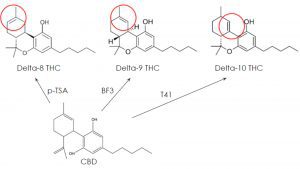
Why are customers looking for those extra cannabinoids? The short answer is it is all about building experience.
D8-THC is currently known to be an active CB1 receptor agonist within the endocannabinoid system, with a potency of roughly 66 to 75%. D8-THC is a natural isomer of D9-THC, and it also classifies as a sesquiterpenoid. D8-THC was first discovered in 1966, is more stable than D9-THC in oxidation and is less expensive to produce in a laboratory setting. It has been shown to assist with appetite stimulation, pain, and vomiting. D8-THC is often compared to strains like OG Kush, wedding cake, and purple punch.
D10-THC can get you high, although it is much less potent than regular delta-9 THC. Anecdotally, delta-10 is commonly reported to provide energising effects, whereas delta-8 is reported to be more sedating. D10-THC is often compared to strains like sour diesel, pineapple express, or super lemon haze.
The new popular cannabinoids
Cannabinoids are easily isomerised. It is a natural flow during the row and curing process that starts from the CBG and blooms through the major CBD/THC then at the end of life, it finishes in CBN. Out of the minors and more specifically from D8-THC a set of derivative cannabinoids were created with a significant psychoactive effect.
What is important to understand about cannabinoids is that they are oleoresins created from an alkaloid which is the real medicinal component and has profound physiological actions on humans. They include many drugs and poisons. In the case of cannabinoids, the alkaloid molecule is connected to a terpene tail which makes it and the oil stronger and more bioavailable.
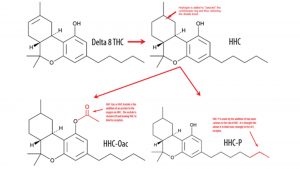
HHC is known to have many similar effects to Delta 9 THC and is almost as strong. HHC and its derivatives produce effects of pain relief, anti-anxiety and a feeling of wellbeing.
HHC-O has an acetate added to HHC which makes it a pro-drug. It bonds to the CB1 receptors. It is stronger than HHC alone due to its higher bioavailability. The positive effects of pain relief, anti-anxiety and feelings of euphoria are going to be stronger than if you have HHC instead.
HHC-P shares many affinities with Delta 9. This longer tail allows them to bind to the cb1 receptor much more stronger than other cannabinoids. HHC-P is estimated to bind at cb1 approximately 33 times stronger than Delta 9 THC.
The seed and fibre
The seed oils include:
- Three polyunsaturated fatty acids,
- linoleic acid,
- alpha-linolenic acid,
- gamma-linolenic acid,
- and common plant molecules.
Experts agree that this 3:1 fatty acid ratio is ideal for health benefits in humans, for example, linoleic acid significantly reduces total cholesterol and low-density lipoprotein (LDL), or “bad” cholesterol
The medical effect of cannabis
The endocannabinoid system (ECS) helps to fine-tune most of the vital physics. It promotes homeostasis and affects the processes that regulate sleep, appetite, pain, inflammation, memory, nausea and even depression. The ECS helps to regulate homeostasis in all major systems of the body, which guarantees that all systems work together.
There are 11 basic body functional systems in the human body:
- Vascular system, CB1.
- Respiratory system, CB1.
- Excretory system, CB2.
- Reproductive system, CB1.
- Nervous system, CB1.
- Muscular system, CB1.
- Endocrine system, CB2.
- Lymphatic system, CB1, CB2.
- Gastrointestinal system, CB2.
- Immune system, CB2.
- Skeletal system, CB2.
It is often mistakenly thought that endocannabinoid receptors are found exclusively in the brain. This is not entirely true, as they can be found in some glands as well as in immune cells. The functions of the receptors are mainly to maintain balance in the body and to monitor the proper course of homeostasis.
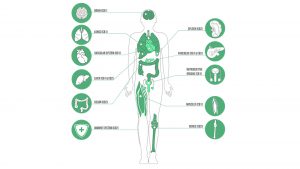
The receptors that act as locks in the endocannabinoid system are CB1 and CB2.
CB1 receptors are found in abundance mainly in the central nervous system (CNS) – the cerebral cortex, basal ganglia, hypothalamus, cerebellum and less in the periphery.
CB2 receptors predominate in the tissues of the immune system – spleen, tonsils, thymus, and immune cells.
The terpenes are now considered the lesser-known modulator that amplifies the overall performance of cannabinoids. The most common terpenes in cannabis are myrcene, pinene, caryophyllene, limonene, terpinolene, linalool, etc. Since the terpenes are the hormones of the plants, they play an active role in the manipulation of our moods and emotions.
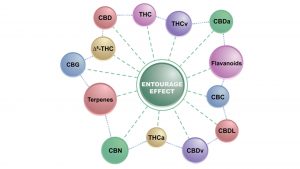
The “entourage” effect is based on utilising all-natural compounds present in cannabis working together to create “the magic power of cannabis”:
- CBD – collagen.
- THC – central nervous system.
- THCV – obesity-associated glucose intolerance.
- CBDA – anti-inflammatory.
- CBC – antitumor effects in breast cancer.
- CBDV – anticonvulsant effects.
- CBN – peripheral nervous system.
- CBG – Stem cell activator.
- Flavonoids – powerful antioxidants.
When we discuss entourage effect and bioavailability the next logical question is do we preserve all those values in the oils we use to formulate our medicine? The cannabis market is young in its maturity and product formulations and quick decisions have been made. For the extraction of the active components, several methods have been implemented. Most of them do not transfer all the medicinal components to the extracts.
That is why PURE5 scientists have developed an extraction methodology that maintains all plant vitality and does not degrade the components from the original strain. The PURE5 equipment uses safe aerosols and performs the extraction at ambient temperature on either fresh (cured) or dry (decarbed) flowers, gently extracting the oil-based components without creating any undesired by-products. The terpenes are also gently extracted along with the full spectrum of cannabinoids thereby preserving all-natural values in a natural pristine oil extraction forming pure strain-specific oil.
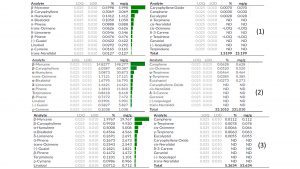
In the diagrams above, the original terpene profile (1) of the plant is preserved by utilising the PURE5 gentle, ambient extraction process in the order and quantity over and over in the live resin (2) and full spectrum (3) oil fraction.
Adding value for customers
We already discussed all the basics of the plant, raw materials, and processes to obtain them and have all the building blocks to add value.
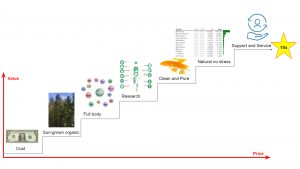
Starting with the unit cost that the customer is always willing to pay and adding the values, this is achieved in the process, for example organically grown strains, maintaining full body entourage cannabinoids, phenols and terpenes, that directly address the metabolic and neurostimulation of the body systems with a high health benefit, extracted in such a gentle way that they preserve all natural values and complete terpene profile that enhances the bioavailability.
All of the above along with properly built consumer trust increases the value of the products to the customer and will more likely have that customer returning for the same products and services. This is how the PURE5 process is adding value to your products and overcomes the crowded cannabis market general offering.
Economics
The below discussion is usually kept as the proprietary extractor knowledge, and no extraction company will discuss this with customers. The reason for that is that the numbers differ between systems and vendors and since the extraction companies are focused on selling their machines, most often shorten the process explanation, especially in numbers.
Below is a parallel between the Capital Expense (CapEx) and Operational Expense (OpEx) that an extractor in the cannabis market should know. In those numbers, only the hard cost of operation (power and loss) is included without taking into account labour and Time to Market.
| Parameters | CO2 | Ethanol | Butane | R134a | Units |
| CapEx | $450,000.00 | $125,000.00 | $250,000.00 | $125,000.00 | $ |
| 10L Volume | 3 | 3 | 3 | 3 | lb |
| particle size | 0.5 | NA | NA | NA | mm |
| Extraction Time | 120 | 40 | 40 | 60 | min |
| Efficiency | 90% | 85% | 95% | 95% | % |
| Recovery Time | 180 | 180 | 60 | 60 | min |
| Solvent per run | 10 | 8 | 8 | 8 | kg |
| Pressure | 310 | 1 | 6 | 9 | bar |
| Loss | 10% | 15% | 10% | 1% | % |
| Solvent Loss | 1 | 1.2 | 0.8 | 0.08 | kg |
| Solvent Cost | $10.00 | $7.00 | $5.00 | $7.00 | $ |
| Cost per Run | $10.00 | $8.40 | $4.00 | $0.56 | $ |
| Power | 20 | 10 | 10 | 2 | kw |
| Energy cost | $6.00 | $3.00 | $3.00 | $0.60 | $ |
| Total per Run | $16.00 | $11.40 | $7.00 | $1.16 | $ |
| Cost per Month | $2,880.00 | $2,052.00 | $1,260.00 | $208.80 | $ |
The only extraction we have not discussed above is the “solventless” rosin press. That extraction is not solventless since it has to go through ethanol for a secondary step. Rosin winterisation is necessary because it is required to remove impurities, like wax, left behind in the rosin. By removing the impurities in the rosin, it keeps and looks fresh for longer, and also increases in THC content.
Knowing your process
Each extraction method delivers quite a different extract consistency. That is because of the properties of the solvent and what it is its selectivity within the plant values. It is essential to understand the nature of the active ingredient to be obtained. In the case of extraction oils, it is a fairly non-polar compound that would be extracted easily with other non-polar compounds.
The other important topic is the aggressiveness of the solvent and the by-products that may be created during the process. As an example, CO2 under supercritical pressure would create acid with the moisture, rosin will burn terpenes and convert cannabinoids, and ethanol is a polar solvent, allowing it to extract both water and fat-soluble plant compounds that need to be purged. Hydrocarbons should be purged thoroughly to avoid poor aftertaste and health complaints.
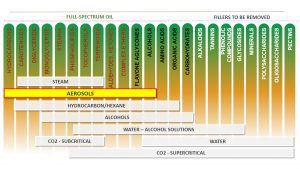
PURE5 uses safe aerosols for extraction that has been used in the pharma industry for decades and the inert nature of the solvent along with the ambient process does not create by-products, which makes it one of the most natural single-run processes. It also minimises the pre-processing since the extraction can be on a complete or ground fresh or dry plant. The processing is quick, and the pure extract is separated from the raw material under the most favourite conditions. Since it is an extremely selective process toward the plant oils, there is no post-processing required.
Time to Market
The Time to Market (TTM) is as important as the CapEx and OpEx for the success of the business. Utilising CO2, ethanol, rosin, and butane needs lengthy pre-and post-processing, which requires a stock of a product to be maintained to satisfy demand. Utilising the PURE5 single-run process can put a product on the cannabis market within 24 hours. Below is an example chart of how multiple products can be created from each fraction the method can produce.
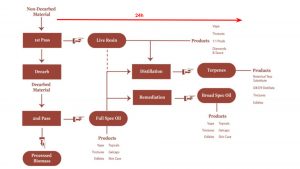
What the PURE5 process creates is a unique type of extract containing all terpenes and cannabinoids that differs by values from every other extract obtained. We simply called the extract “Hash Resin” which means a hash drug made by compressing and processing parts of the cannabis plant, typically focusing on flowering buds containing the most trichomes. Resin is a solid or highly viscous organic substance of plant or synthetic origin that is typically convertible into polymers.
Summary
Our 10x formula for success in the competitive cannabis market is simple and comprises the answers to a few simple questions keeping full awareness of the customer, market and the tools you are using to get to your target profit:
- Who is your customer (what is the psychology)?
- How much will it cost you to acquire it (plan your expense)?
- What products will you plan to produce (capture the demand)?
- What process will you choose (build the value)?
- How much is your CapEx (start-up capital)?
- How much is your OpEx (keep the cost low)?
- What is your ROI (be successful in months)?
- What is the Time-To-Market (on demand)?
- What type of people (partners) do you need?
- What are your one, five and ten-year goals?
Share your success with PURE5. We offer cutting-edge worldwide exclusive technology to the cannabis market that can deliver a post-winterised terpene-rich oil in one gentle extraction pass. The oil is fully strain-specific, highly potent, and ready to formulate in products right off the extraction.
For inquiries contact:
Dr. George Stantchev, CEO
george@comerg.com
(602) 992-0744
www.pure5extraction.com





